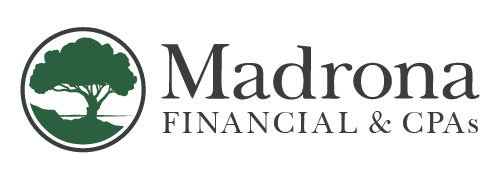
As the 2016 tax filing deadline approaches now’s an excellent time to review your current tax planning strategies to ensure they’re still meeting your needs and to develop plans for 2017. It’s also a good time to take advantage of planning opportunities that could save you money now and in the coming year.
Here are some tips to help you prepare for tax filing this year and steps to take to minimize your tax burden in years to come.
1. Get organized as soon as possible (and try to stay that way).
This may seem like a no-brainer, but the sooner you get your receipts and information together the better off you’ll be in April. Your financial affairs are all interconnected, and this is where the Madrona Bundle can come in. We can review your situation to be sure that your financial planning, retirement, and investing strategies are integrated with strategic tax planning.
2. Keep important due dates in mind.
Dates are a key component to tax planning. Don’t forget:
-
1. April 1st, 2017: First Time RMDs are Due (see next tip)
-
2. April 18th, 2017
-
2016 tax return or tax return extension form is due
-
1st quarter tax payment due (From 1040-ES) if you’re self-employed or have income that requires quarterly estimated taxes be paid.
-
This is also the last day that you can contribute to your retirement accounts (IRAs or Roth IRAs) for 2016. We recommend that you try to max these out every year.
-
Foreign Bank Account Reporting (FBAR) is due.
-
3. June 15th, 2017: 2nd Quarter 2017 estimated tax payment due
-
4. September 15th, 2017: 3rd Quarter 2017 estimated tax payment due
-
5. October 16th, 2017:
-
If you filed an extension for your return, it’ll be due today!
-
Last chance for undoing a Roth Conversion for 2016. This could be good if your IRA lost money since the time you originally converted.
-
6. December 31, 2017:
-
Last day to take your RMDs and have eligible charitable contributions count toward your tax returns for the year.
-
7. January 15th, 2018: 4th quarter estimated tax payment due
3. Are you 70.5 or older? Don’t forget your Required Minimum Distributions!
First time dealing with RMDs? When you turn 701/2, your first withdrawal may be required to be taken by April 1 of the following year and by December 31 every year after. If you forget, you could be hit with an unnecessary 50% penalty tax. You’re also allowed to donate up to $100,000 of your RMD to a 501(c)(3) organization to lower your tax burden. You worked hard and saved, have a strategy for your RMDs and don’t let a late penalty diminish your savings.
4. Be sure to employ tax diversity in your retirement plan.
When it comes to retirement, having accounts that receive varying tax treatment is a key strategy. Since different types of investments impact your taxes differently you should work with us to determine how much you should have in each bucket and to minimize your overall tax burden.
5. Understand tax basics and the difference between the terms tax credit, tax deduction, tax deferrals, and tax-free. Consult your Madrona financial advisor for more information on these topics.
6. Tax Identity Theft is a Significant Threat
Online tax filings allow for greater convenience, but also leave us more vulnerable to cyber-security threats if we’re not careful. Be sure you’re using a secure browser if you are going to file online. Beware if you receive a notice or letter regarding a tax return, tax bill or income that does not apply to you; or if you get an unsolicited e-mail or other contact asking for your bank account number or other personal information. Also, be cautious if you receive a robocall insisting that you must call back and settle your tax bill. The IRS does not demand immediate payment over the phone, threaten to arrest you or demand your credit or debit card number.
7. Give to others and give back.
While the deadline for gifts and deductible charitable contributions for 2016 taxes has passed, there’s never a bad time to give back. When gifting to loved ones, you’re able to gift $14,000 to as many individuals as you like. You may also be eligible for tax credits or deductions for helping with educational costs. When donating items, don’t forget to keep written documentation of donations over $250, appraisals for items over $500, and understand the rules for bigger donations.
8. Don’t be afraid to pay off your house just because you don’t want to lose the mortgage interest tax deduction.
The mortgage interest tax deduction doesn’t always benefit you as much as you think it will. Depending on your individual situation, you may be better off paying off your mortgage. Entering retirement without a mortgage payment is a great way to increase your monthly cash flow.
9. If you’re self-employed don’t forget the self-employment tax.
Many people don’t put away taxes as their income is earned. When self-employed, you pay tax at your highest marginal rate plus another 15% for a self-employment tax. This can create a large tax bill if not understood or planned for.
10. Take care of your Medicare taxes.
If you’re a high-wage earner, you’ll have to pay additional taxes beyond what your employer takes out of your paycheck for Medicare. This year for earned income above $250,000 for joint filers ($200,000 for single), you’ll owe an extra .9%. Investments with capital gains, dividends, or interest may also cause you to qualify for a 3.8% Medicare tax on the income generated. Be sure to discuss with an investment advisor and your accountant regarding your individual situation.
11. What will a new administration mean to you?
Change is sure to be on the horizon with the Trump administration. It’s probable that there will be changes that will impact tax, business, and financial regulation, as well as your tax return and overall financial planning. Before deciding on new strategies, consult your tax and financial advisors to avoid potential costs and negative consequences.
12. Have a team of professionals to support you.
Tax laws are confusing and ever-changing. At Madrona Financial Services we help you develop long-term strategies for tax minimization in regards to your Social Security benefits, retirement, investments, and your overall financial plan. We are both a CPA and investment advisory firm, so your investments, retirement, and tax planning will always be integrated. Our goal is to give you confidence that you have a plan to potentially minimize your tax burden and maximize your nest egg potential.
Call us today at 844-MADRONA

